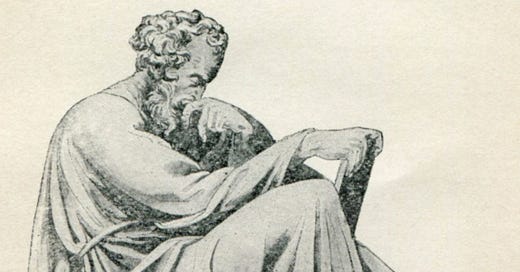A few days ago, my son Theodore had an accident. Not a life-threatening accident, but the sort of event that requires immediate and specific attention if it isn’t going to be a serious matter down the road.
My wife Mengyu was doing laundry – I was in my office, with the intention of reading a book by Rowan Williams, and had, I now shamefully admit, fallen asleep in my chair – and Theodore grabbed a laundry pod when she was busy loading the dryer. He squeezed it; it burst; some of it got in his eyes.1 Laundry detergents are concentrated alkaline solutions, and so this can cause severe damage if left unattended —knowing this, we immediately took action. I received a frantic call and ran into the house, and I found them in the shower, Mengyu doing her best to flush out his eyes. I took over, holding him as I tried to get as much of the stuff out of his eyes as possible.
At this point, I should say the obvious. We know he shouldn’t have be able to ever reach any sort of laundry detergent or cleaning supply; every other dangerous substance is behind a lock; somehow, though, in the few seconds between moving a container down and putting some laundry into the dryer, he grabbed it; he’s very tall for his age (the size of many 3 year olds, despite only being 16 months), and we sometimes misjudge his capacities (in this case, his reach); we’re now going through the house to make sure nothing like this happens again.
The rest of the day was frantic. First, more flushing at home. Then a quick drive to the pediatrician to get him checked out; they flushed his eyes again and told us to go to the E.R. if he was still in pain later. He was, it turned out, and we spent the entire evening in the emergency room. They flushed his eyes again, this time more thoroughly, checked for damage and monitored his pH levels (he came back as a 7, perfectly neutral), and then sent us home. He was glad to go to sleep; we all were. He woke up annoyed the following morning, but that seemed to be due to a change in routine; like both his mother and father, he’s a creature of habit.
According to the physician’s assistant who worked closely with us at the E.R., he’ll be totally fine. He’ll be a bit irritated for a few days, but the eyes aren’t damaged. We acted quickly, and the nurses and physicians acted well, so we should be in the clear.
I suppose this is where I should pivot and speak about the philosophy of it all — that’s the point of this newsletter.
Does studying philosophy help you do anything?
That is a common question you might get asked — the implication, usually not obscured, is that it doesn’t. There are three sorts of answers people like to give.
First, they like to say that philosophy teaches you how to think. There is a sense in which this is true, though I’m wary of how this answer unfolds. We point to higher GREs, LSATs, and and MCATs as proof that philosophy students learned some critical intellectual skills during their education. (And I think that point is true enough: a philosophical education is one that still requires substantial reading, discussion, writing, etc., and so students do benefit.) I don’t love the way this is really an instrumental way of thinking about thinking, as if we needed a standardized test to prove that we’re on to something. Aristotle never took the ACT, and that’s probably a good thing. We say that philosophy helps you do something because it taught you how to think, which is crucial for doing…something.
Second, they like to say that philosophy doesn’t help you do anything, and that therefore it is worthless. Philosophy is just idle speculation, they say. There’s no point to any of it. Better to move on, just go and become biologists (fine) or business consultants (please, no). Find something useful to do with your time, please. It should be obvious that I dislike this way of responding. And that’s because there is a third way of answering which I vastly prefer.
Keep reading with a 7-day free trial
Subscribe to Commonplace Philosophy to keep reading this post and get 7 days of free access to the full post archives.




